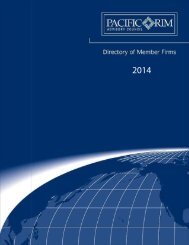To <strong>the</strong> extent that <strong>the</strong> charge is a float<strong>in</strong>g charge, certa<strong>in</strong> claims<strong>of</strong> preferred credi<strong>to</strong>rs (such as employees) will take priority over<strong>the</strong> charge as set out above. In order <strong>to</strong> m<strong>in</strong>imise <strong>the</strong> risk <strong>of</strong> thisoccurr<strong>in</strong>g, <strong>the</strong> rat<strong>in</strong>g agencies which rate securities will normallyrequire that <strong>the</strong> issuer is restricted from engag<strong>in</strong>g <strong>in</strong> activities(such as hav<strong>in</strong>g employees) which could give rise <strong>to</strong> preferredclaims (this is discussed <strong>in</strong> section 9.7).9.5 Transactions void or voidable due <strong>to</strong> <strong>in</strong>solvencyUnder Part 5.7B <strong>of</strong> <strong>the</strong> Corporations Act, certa<strong>in</strong> transactionsmay be void or voidable upon <strong>the</strong> w<strong>in</strong>d<strong>in</strong>g up <strong>of</strong> a company.These provisions will be relevant <strong>in</strong> a securitisation program upon<strong>the</strong> w<strong>in</strong>d<strong>in</strong>g-up <strong>of</strong>: <strong>the</strong> issuer; any seller <strong>of</strong> assets <strong>to</strong> <strong>the</strong> issuer; orany o<strong>the</strong>r person who provides rights <strong>to</strong> <strong>the</strong> issuer as part <strong>of</strong> <strong>the</strong>program (such as a liquidity facility or swap provider). Although<strong>the</strong> whole <strong>of</strong> Part 5.7B must be considered <strong>in</strong> relation <strong>to</strong> asecuritisation program, <strong>the</strong> provisions most likely <strong>to</strong> be <strong>of</strong> concernare those relat<strong>in</strong>g <strong>to</strong> unfair loans and uncommercial transactions.9.5.1 Unfair loansA transaction may be set aside under Part 5.7B <strong>of</strong> <strong>the</strong>Corporations Act if it is an unfair loan with<strong>in</strong> <strong>the</strong> mean<strong>in</strong>g <strong>of</strong>section 588FD(1).A loan will only be unfair if ei<strong>the</strong>r <strong>the</strong> <strong>in</strong>terest or charges payable<strong>in</strong> respect <strong>of</strong> <strong>the</strong> loan are “ex<strong>to</strong>rtionate” or become“ex<strong>to</strong>rtionate” as a result <strong>of</strong> a variation. There have been noreported decisions <strong>of</strong> <strong>the</strong> courts that have considered <strong>the</strong>mean<strong>in</strong>g <strong>of</strong> <strong>the</strong> term “ex<strong>to</strong>rtionate”. It is usually <strong>the</strong> case,however, that <strong>in</strong>terest rates on bonds issued, or on fundsborrowed under a liquidity facility, <strong>in</strong> a securitisation program aredeterm<strong>in</strong>ed with reference <strong>to</strong> prevail<strong>in</strong>g market rates. It isunlikely that <strong>in</strong>terest rates determ<strong>in</strong>ed <strong>in</strong> this manner would beregarded by <strong>the</strong> courts as ex<strong>to</strong>rtionate.9.5.2 Uncommercial transactionsA transaction may be set aside under Part 5.7B <strong>of</strong> <strong>the</strong>Corporations Act if it is an uncommercial transaction with<strong>in</strong> <strong>the</strong>mean<strong>in</strong>g <strong>of</strong> section 588FB(1) and is also an <strong>in</strong>solvent transactionwith<strong>in</strong> <strong>the</strong> mean<strong>in</strong>g <strong>of</strong> section 588FC.A transaction is an uncommercial transaction <strong>of</strong> <strong>the</strong> company:“if, and only if, it may be expected that a reasonable person <strong>in</strong><strong>the</strong> company’s circumstances would not have entered <strong>in</strong><strong>to</strong> <strong>the</strong>transaction, hav<strong>in</strong>g regard <strong>to</strong>:(a) <strong>the</strong> benefits (if any) <strong>to</strong> <strong>the</strong> company <strong>of</strong> enter<strong>in</strong>g <strong>in</strong><strong>to</strong> <strong>the</strong>transaction; and(b) <strong>the</strong> detriment <strong>to</strong> <strong>the</strong> company <strong>of</strong> enter<strong>in</strong>g <strong>in</strong><strong>to</strong> <strong>the</strong>transaction; and(c) <strong>the</strong> respective benefits <strong>to</strong> o<strong>the</strong>r parties <strong>to</strong> <strong>the</strong> transaction <strong>of</strong>enter<strong>in</strong>g <strong>in</strong><strong>to</strong> it; and(d) any o<strong>the</strong>r relevant matter.”A transaction <strong>of</strong> <strong>the</strong> company is an <strong>in</strong>solvent transaction:“if, and only if, it is ... an uncommercial transaction <strong>of</strong> <strong>the</strong>company, and:(a) any <strong>of</strong> <strong>the</strong> follow<strong>in</strong>g happens at a time when <strong>the</strong> company is<strong>in</strong>solvent:(i) <strong>the</strong> transaction is entered <strong>in</strong><strong>to</strong>; or(ii) an act is done, or an omission is made, for <strong>the</strong> purpose <strong>of</strong>giv<strong>in</strong>g effect <strong>to</strong> <strong>the</strong> transaction; or(b) <strong>the</strong> company becomes <strong>in</strong>solvent because <strong>of</strong>, or because <strong>of</strong>matters <strong>in</strong>clud<strong>in</strong>g:(i) enter<strong>in</strong>g <strong>in</strong><strong>to</strong> <strong>the</strong> transaction; or(ii) a person do<strong>in</strong>g an act, or mak<strong>in</strong>g an omission, for <strong>the</strong>purpose <strong>of</strong> giv<strong>in</strong>g effect <strong>to</strong> <strong>the</strong> transaction.”As noted above, <strong>in</strong> addition <strong>to</strong> be<strong>in</strong>g relevant upon <strong>the</strong> <strong>in</strong>solvency<strong>of</strong> <strong>the</strong> issuer, <strong>the</strong>se provisions may apply <strong>in</strong> <strong>the</strong> event <strong>of</strong> <strong>the</strong><strong>in</strong>solvency <strong>of</strong> o<strong>the</strong>r parties <strong>in</strong>volved <strong>in</strong> <strong>the</strong> program (such as <strong>the</strong>seller <strong>of</strong> assets <strong>to</strong> <strong>the</strong> issuer or liquidity facility or swapproviders). This could result <strong>in</strong> <strong>the</strong> sale <strong>of</strong> such assets be<strong>in</strong>g setaside by a court.However, even if a transaction is an uncommercial transactionand an <strong>in</strong>solvent transaction, section 588FG(2) prevents a courtfrom mak<strong>in</strong>g an order:“... materially prejudic<strong>in</strong>g a right or <strong>in</strong>terest <strong>of</strong> a person if <strong>the</strong>transaction is not an unfair loan <strong>to</strong> <strong>the</strong> company and it is provedthat:(a) <strong>the</strong> person became a party <strong>to</strong> <strong>the</strong> transaction <strong>in</strong> good faith; and(b) at <strong>the</strong> time when <strong>the</strong> person became such a party;(i) <strong>the</strong> person had no reasonable grounds for suspect<strong>in</strong>g that<strong>the</strong> company was <strong>in</strong>solvent at that time or would become<strong>in</strong>solvent ...; and(ii) a reasonable person <strong>in</strong> <strong>the</strong> person’s circumstances wouldhave had no such grounds for suspect<strong>in</strong>g; and(c) <strong>the</strong> person has provided valuable consideration under <strong>the</strong>transaction or has changed his, her or its position <strong>in</strong> relianceon <strong>the</strong> transaction.”55
Section 588FG provides a measure <strong>of</strong> protection <strong>to</strong> <strong>in</strong>ves<strong>to</strong>rsaga<strong>in</strong>st <strong>the</strong> subsequent w<strong>in</strong>d<strong>in</strong>g-up <strong>of</strong> any party <strong>to</strong> a transaction<strong>in</strong> a securitisation program. However, <strong>the</strong> rat<strong>in</strong>g agencies arenever<strong>the</strong>less concerned <strong>to</strong> ensure that <strong>the</strong> transactions <strong>in</strong> asecuritisation program are commercial and, <strong>in</strong> particular, that anysale <strong>of</strong> assets <strong>to</strong> <strong>the</strong> issuer is a true sale for full value (asdiscussed below).9.6 Segregated issuersSegregated issuers are issuers who are able <strong>to</strong> issue separateseries <strong>of</strong> securities which are backed by different assets andwhich are rated <strong>in</strong>dependently by <strong>the</strong> rat<strong>in</strong>g agencies (and whichmay have different rat<strong>in</strong>gs). In order <strong>to</strong> be considered asegregated issuer by <strong>the</strong> rat<strong>in</strong>g agencies it is necessary, amongs<strong>to</strong><strong>the</strong>r th<strong>in</strong>gs, that:• a default by <strong>the</strong> issuer <strong>in</strong> respect <strong>of</strong> one series andenforcement <strong>of</strong> <strong>the</strong> security must not <strong>of</strong> itself cause a defaul<strong>to</strong>r enforcement <strong>of</strong> security <strong>in</strong> respect <strong>of</strong> ano<strong>the</strong>r series;• credi<strong>to</strong>rs <strong>in</strong> respect <strong>of</strong> one series must not have access <strong>to</strong> <strong>the</strong>assets held <strong>in</strong> relation <strong>to</strong> any o<strong>the</strong>r series; and• <strong>the</strong>re must be only a very remote likelihood <strong>of</strong> <strong>the</strong> issuerbe<strong>in</strong>g wound up dur<strong>in</strong>g <strong>the</strong> program. This must be <strong>the</strong> casenotwithstand<strong>in</strong>g that <strong>in</strong> a w<strong>in</strong>d<strong>in</strong>g up <strong>of</strong> <strong>the</strong> issuer, <strong>in</strong>ves<strong>to</strong>rs<strong>of</strong> a series will reta<strong>in</strong> <strong>the</strong>ir rights <strong>in</strong> relation <strong>to</strong> <strong>the</strong> relevantsecuritised assets <strong>of</strong> that series. This is because <strong>the</strong> w<strong>in</strong>d<strong>in</strong>gup<strong>of</strong> <strong>the</strong> issuer will <strong>in</strong>evitably require <strong>the</strong> enforcement <strong>of</strong> <strong>the</strong>security held for all series and a result<strong>in</strong>g early term<strong>in</strong>ation <strong>of</strong><strong>the</strong> program.Segregation criteria are relatively easy <strong>to</strong> satisfy <strong>in</strong> relation <strong>to</strong>trust issuers. Segregation is achieved simply by creat<strong>in</strong>g a newtrust for each segregated series.Segregation for corporate issuers, however, is more difficult <strong>to</strong>achieve. It can be done effectively by:• creat<strong>in</strong>g separate security over different assets for eachseries;• limit<strong>in</strong>g <strong>the</strong> default provisions <strong>in</strong> <strong>the</strong> documentation for eachseries <strong>to</strong> defaults by <strong>the</strong> issuer <strong>in</strong> relation <strong>to</strong> that series orevents that occur <strong>in</strong> relation <strong>to</strong> <strong>the</strong> assets <strong>of</strong> that series;• limit<strong>in</strong>g <strong>the</strong> rights <strong>of</strong> each person who enters <strong>in</strong><strong>to</strong> atransaction with <strong>the</strong> issuer <strong>in</strong> relation <strong>to</strong> a series (<strong>in</strong>clud<strong>in</strong>g<strong>in</strong>ves<strong>to</strong>rs) <strong>to</strong> <strong>the</strong>ir share <strong>of</strong> <strong>the</strong> proceeds <strong>of</strong> realisation <strong>of</strong> <strong>the</strong>assets <strong>of</strong> that series upon enforcement <strong>of</strong> <strong>the</strong> security forthat series; and• limit<strong>in</strong>g <strong>the</strong> rights <strong>of</strong> <strong>the</strong> issuer so that <strong>the</strong> issuer is unable <strong>to</strong>do anyth<strong>in</strong>g o<strong>the</strong>r than act as <strong>the</strong> issuer <strong>in</strong> <strong>the</strong> securitisationprogram and, <strong>in</strong> particular, is not permitted <strong>to</strong> <strong>in</strong>cur anyliability o<strong>the</strong>r than a liability which is limited as described <strong>in</strong><strong>the</strong> previous paragraph.9.7 Rat<strong>in</strong>g agencies criteriaThe rat<strong>in</strong>g agencies impose a number <strong>of</strong> restrictions andrequirements upon issuers as a condition <strong>of</strong> rat<strong>in</strong>g <strong>the</strong>ir securities<strong>in</strong> order <strong>to</strong> m<strong>in</strong>imise <strong>the</strong> risk <strong>to</strong> <strong>in</strong>ves<strong>to</strong>rs <strong>of</strong> <strong>the</strong> <strong>in</strong>solvency orw<strong>in</strong>d<strong>in</strong>g-up <strong>of</strong> <strong>the</strong> issuer or <strong>of</strong> any o<strong>the</strong>r party <strong>to</strong> <strong>the</strong> transactionsthat make up <strong>the</strong> securitisation program. The follow<strong>in</strong>g is asummary <strong>of</strong> <strong>the</strong> most significant <strong>of</strong> <strong>the</strong>se and <strong>the</strong> reasons for<strong>the</strong>ir imposition.9.7.1 Commercial sale <strong>of</strong> assetsWhere <strong>the</strong> securitised assets are not orig<strong>in</strong>ally <strong>the</strong> assets <strong>of</strong> <strong>the</strong>issuer, <strong>the</strong> issuer must acquire <strong>the</strong> assets <strong>in</strong> a transaction whichis not, from <strong>the</strong> po<strong>in</strong>t <strong>of</strong> view <strong>of</strong> ei<strong>the</strong>r party, an uncommercialtransaction. A failure <strong>to</strong> acquire assets for <strong>the</strong> proper value couldresult <strong>in</strong> <strong>the</strong> purchase be<strong>in</strong>g set aside under Part 5.7B <strong>of</strong> <strong>the</strong>Corporations Act (as discussed above).9.7.2 No mix<strong>in</strong>g <strong>of</strong> assetsWhere <strong>the</strong> issuer is a trust issuer, it is important that <strong>the</strong> assets<strong>of</strong> <strong>the</strong> trust are dist<strong>in</strong>guishable from, and are not mixed with, anyo<strong>the</strong>r assets <strong>of</strong> <strong>the</strong> issuer or <strong>the</strong> assets <strong>of</strong> any o<strong>the</strong>r trust <strong>of</strong>which <strong>the</strong> issuer is trustee. If assets are mixed <strong>the</strong>y may lose<strong>the</strong>ir characterisation as property <strong>of</strong> <strong>the</strong> trust and consequently<strong>the</strong>ir protection from claims by any general credi<strong>to</strong>rs <strong>of</strong> <strong>the</strong>trustee. Where <strong>the</strong> issuer is a corporate issuer, issu<strong>in</strong>gsegregated series <strong>of</strong> securities, <strong>the</strong> assets back<strong>in</strong>g each seriesmust similarly be kept separate so that <strong>the</strong> security for one seriesmay be enforced without impact<strong>in</strong>g on <strong>the</strong> cont<strong>in</strong>ued operation <strong>of</strong>ano<strong>the</strong>r series.9.7.3 Limited powers <strong>of</strong> issuersBy limit<strong>in</strong>g <strong>the</strong> powers <strong>of</strong> trust issuers it is possible <strong>to</strong> limit <strong>the</strong>potential for credi<strong>to</strong>rs <strong>to</strong> exist who have access, throughsubrogation <strong>to</strong> <strong>the</strong> trustee’s right <strong>of</strong> <strong>in</strong>demnity, <strong>to</strong> <strong>the</strong> assets <strong>of</strong><strong>the</strong> trust. So, for <strong>in</strong>stance, if a trustee is prohibited by <strong>the</strong> terms<strong>of</strong> <strong>the</strong> trust deed from engag<strong>in</strong>g employees <strong>in</strong> its capacity astrustee <strong>the</strong>n if, <strong>in</strong> breach <strong>of</strong> <strong>the</strong> trust deed, <strong>the</strong> trustee purports<strong>to</strong> engage employees <strong>in</strong> its capacity as trustee nei<strong>the</strong>r <strong>the</strong> trusteenor those employees through it will be entitled <strong>to</strong> be <strong>in</strong>demnifiedfrom <strong>the</strong> trust assets aga<strong>in</strong>st <strong>the</strong> costs <strong>of</strong> <strong>the</strong> employment.56






